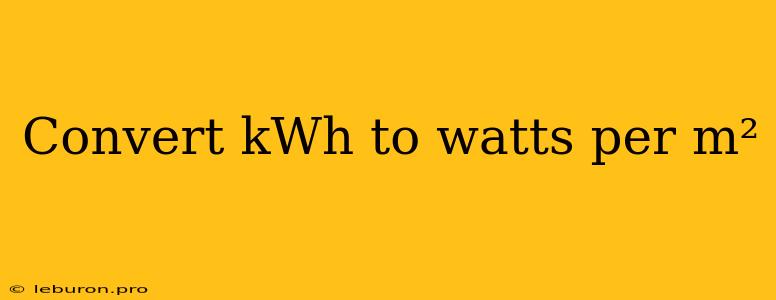Understanding how much energy is being used in a given area is crucial for various applications, including building energy efficiency, solar panel sizing, and lighting design. One common unit of energy measurement is kilowatt-hours (kWh), which represents the amount of energy consumed over a specific time period. However, when assessing energy usage over a particular area, a more relevant unit is watts per square meter (W/m²). This article will delve into the conversion process between kWh and W/m², exploring the underlying concepts and providing practical examples.
Understanding the Units
- Kilowatt-hours (kWh): This unit measures the total amount of energy consumed over a specified period. One kWh is equivalent to the energy consumed by a 1-kilowatt (kW) appliance running for one hour.
- Watts per square meter (W/m²): This unit represents the power density, or the amount of power consumed or generated per square meter of area.
The Conversion Process
Directly converting kWh to W/m² is not possible without additional information. This is because kWh represents energy consumed over time, while W/m² represents power consumed over area.
To convert kWh to W/m², you need to know:
- The time period over which the kWh was measured: This could be an hour, a day, a month, or any other duration.
- The area over which the energy was consumed: This could be the floor area of a room, the surface area of a building, or the area of a solar panel.
Conversion Formula
The formula for converting kWh to W/m² is:
W/m² = (kWh x 3600) / (time in seconds x area in m²)
Where:
- 3600 is the number of seconds in an hour, used to convert the time from hours to seconds.
- Time in seconds is the duration for which the kWh was measured, expressed in seconds.
- Area in m² is the area over which the energy was consumed or generated, expressed in square meters.
Example:
Let's say a building consumes 100 kWh of energy in 24 hours and has a floor area of 500 m². To convert this kWh value to W/m², we can use the formula:
- Time in seconds: 24 hours * 3600 seconds/hour = 86400 seconds
- W/m² = (100 kWh x 3600) / (86400 seconds x 500 m²) = 0.083 W/m²
This means the building consumes an average of 0.083 W/m² of power over its entire floor area.
Applications of kWh to W/m² Conversion
Here are some practical applications of converting kWh to W/m²:
- Building Energy Efficiency: By converting the total energy consumption of a building (in kWh) to W/m² based on its floor area, you can determine the average power consumption per unit area. This information can be used to assess the building's energy performance and identify areas for improvement.
- Solar Panel Sizing: Knowing the desired power output per square meter (W/m²) allows you to calculate the required area of solar panels to generate a specific amount of energy. For example, if you want to generate 100 W/m² of solar power, you can determine the necessary solar panel area based on the panel's efficiency.
- Lighting Design: Converting the energy consumption of lighting fixtures (in kWh) to W/m² based on the illuminated area can help you optimize lighting design. This allows you to choose the most efficient lighting solutions while achieving the desired illumination levels.
Conclusion
Converting kWh to W/m² is an essential step in understanding and optimizing energy usage over a given area. This conversion is not a direct process and requires additional information about the time period and area involved. By applying the appropriate formula and considering the specific context, you can effectively convert between these units and gain valuable insights into energy consumption and efficiency.
